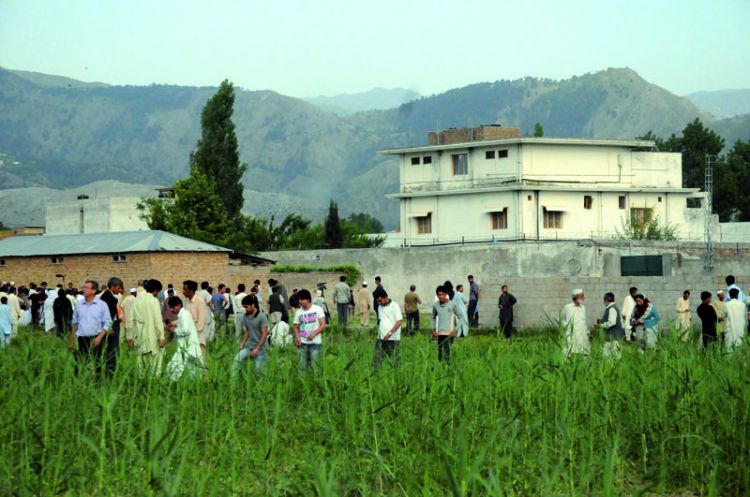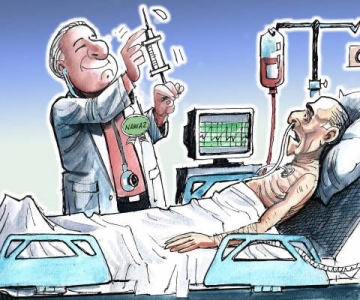My piece for The News, Pakistan
As details of Operation Geronimo unfold, more and more questions are being raised regarding Pakistan’s role in the war on terror. Sadly, millions of Pakistanis are even more confused than the global pundits. Other than the lunatic fringe thriving in the folds of mainstream media, ordinary Pakistanis are dumbfounded at the prospect of the world’s most wanted man living next to the deep state’s power-house, i.e., the Pakistan military academy. If bin Laden was indeed residing in a purpose-built house with extra thick walls and security cameras then how come Pakistan’s most ‘efficient’ institution was unaware of this lethal presence? Furthermore, if they were not involved in the operation then how could a mammoth defence establishment allow such a clandestine operation by a foreign country which violated air space and international laws?
Governance crisis: Some of these questions will be answered in due course and some will perhaps turn into eternal conundrums. Perhaps, the most pressing issue then remains, who governs Pakistan and in what manner? Seemingly a constitutional republic, Pakistan’s representative and relatively accountable institutions surely do not steer the ‘national security’ policies. The latter have their own limitations and imperatives of rent-seeking but they are marginal to core policies. Here is the fundamental disconnect and reasons for the flourishing non-transparent culture.
Crisis exposed: The aftermath of OBL’s demise has displayed the fragmentation of governance even more. From the long hours of silence on part of the elected head of the state and the government to poorly-drafted press releases by the Foreign Office indicate chaos within the way state machinery operated. In this wider culture of incompetence and non-transparency, it may even be the case that parts of the security establishment remained unaware of bin Laden’s location. A typical, overgrown and unaccountable bureaucracy rarely allows for the left hand to know what the right one is up to. Small wonder that the Prime Minister, President, ISI and Foreign Office have said different things, indicating the real malaise of fragmentation of state power. Forget everything else, this lack of a coordinated response by itself exemplifies the crisis of governance in Pakistan.
Institutional limbo: Worse, that section of unregulated media by either denying the whole operation or extolling late OBL is only radicalising the public opinion. Whose interest does this serve? Recent polls have shown that less than 18 percent of Pakistanis supported OBL. It is time for the media to show responsibility and for the dead-duck Pakistan Media Regulatory Authority to issue guidelines on sensational conspiracy theories, and opinions that glorify terrorism need to be arrested for the long term interests of Pakistan. It seems that all institutions were in a state of limbo when such a crisis hit Pakistan.
National security questioned: This is why the role of military efficiency and its complicity or incompetence has for the first time come under public scrutiny. The last time this happened was in 1971 when the media was controlled, its outreach was limited and Pakistanis were traumatised by the break-up of the country. While global analysts and fortune-seeking hacks continue to describe every bit of the OBL saga, what is happening within Pakistan is of immense significance. The last time this happened was during the lawyers’ movement when the obvious flaws of unrepresentative rule became a popular subject. Musharraf’s last days were significant as the popular military base in Punjab for the first time criticised military rule and joined the political mobilisation against Musharraf.
After the elections of 2008, the military leadership by remaining neutral salvaged its image to a considerable degree. The turning point in reviving the martial nationalism narrative came about when in the aftermath of Mumbai attacks in 2008, the nation rallied behind the army in response to the threats relayed by the Indian media. While the politicians stuck together from 2007-2008, their in-fighting on the judges’ issue and other issues of turf and power-sharing allowed the military to resume its central role as the mediator. Thus, the long march by Nawaz Sharif was called off through the intervention of Army Chief. A gradual shift of foreign and national security policies in favour of direct army intervention also took place thereafter. Two incidents confirmed this: first, when the army issued a direct critique of the Kerry-Lugar-Berman aid legislation (bypassing the civilian ministry in charge) and second when secretaries of various ministries briefed the GHQ in 2010.
The political elites meanwhile ventured to strengthen the constitutional and legal basis for effective governance via agreements on the National Finance Commission Award (in 2009) and later the passage of 18th Amendment, which corrected the anomalies inserted into the Constitution by General Zia and Musharraf. However, the gradual erosion of state legitimacy and its weakening grip, especially at the local levels, has made the task of governing intractable. With insurgencies all across the country — political in Balochistan and ideological in the Punjab and northwest — the federal and provincial governments have appeared to the public as inept and unfit to manage basic issues of law and order and maintain reliable delivery of services (energy supplies are the most glaring example).
Game-changer? Until the night of May 1, the rules of the game were clear. It was the army in the driving seat, attending to the strategic dialogues, calling the shots on India and Afghan policies and of course, indirectly influencing the economic policies and perhaps the allocations as well. A surgical operation against OBL has altered this pattern, for the military has gone on the defensive trying to explain to the world that its intelligence systems had failed and to the domestic public opinion that it had no idea about the operation. Either way, it remains at the receiving end. Pakistanis want to know the real facts and require answers to what our involvement in this operation was.
Citizens’ right to know: The 18th Amendment has made the right to information as a fundamental right of Pakistanis. It is half a light year away from being enforced and implemented. Yet, the OBL saga provides an opportunity for citizens to ask state institutions as to what they were doing for all these years, when unmanned drones were attacking homes and installations in FATA left, right and centre? The elected Parliament can no longer make excuses for its lack of pro-active vigilance. A multi-party parliamentary committee should now investigate the conduct of Pakistan’s security agencies in either abetting protection of OBL or at best not knowing what he was doing for years next to a military institution.
A little door may have opened for the weak, fragile ‘elected’ side of the state to show initiative. The chances of them doing this successfully are extremely slim. However, this is the time for the civil society and progressive forces within media to lobby and pressurize them into taking action. Otherwise, the failing state thesis is bound to become a reality. Al Qaeda has openly declared war on Pakistan and now its domestic partner – Tehreek-i-Taliban Pakistan – has also vowed revenge. This should ring alarm bells for all those who have been milking the cash cow – Pakistan – for decades. Time for putting an end to the senseless renting of the state may have come.
There is no alternative to civilian and military accountability in Pakistan. The longer this is denied and elected officials absolve themselves of this fundamental responsibility, the greater the risk of heading towards a completely ungovernable and fragmented state.
| Questions on the Operation | Official Response | Public Perceptions |
| Did Pakistan know about OBL’s presence in Abbottabad? | Intelligence failure resulted in this oversight | How could a mammoth state machinery not know |
| How long was OBL staying in Abbottabad? | A few months only – not exactly known | 5-6 years; his wife consulted local doctors |
| Was Pakistan consulted before Operation Geronimo? | No | CIA denies prior knowledge |
| US choppers were allowed to violate Pakistani airspace? | Stealth helos and blind spots | Covert nature of the operation; duration? |
| Was one of the US choppers shot down? | Mechanical failure led to the crash | Due to resistance from the OBL compound |
| Who gave permission for the construction of the compound? | Private individuals completed in 2005 | Government would have definitely known |
| Who cut power in the local area and asked people to stay indoors | No | Announcements made: people to stay indoors |
| Why have the photos of Op-Geronimo not been released? | Too gruesome for viewing; fear backlash | something fishy about the whole operation |
| Why did Obama acknowledge Pakistani cooperation? | The intelligence used was received from Pakistan | America’s earlywithdrawal from Afghanistan |
| Why did it take so long to inform the Pakistani people? | Since we didn’t know, we had to find the facts | Incompetence; civil-military divides |
| Different views of Zardari, FO and ISI officials? | None | The civilian government was in dark |
| Why did the White House change initial account after 2 days? | None | Eyewitness accounts ought to reconcile |
| Intelligence failure or incompetence, who to blame? | Army Chief has called for an investigation | Both Gillani and Kayani should resign |
| How can a foreign citizen reside in Pakistan without a valid visa ? | None | Pakistan is a sanctuary of terrorists. No rule of law |
The writer is a policy adviser based in Lahore. He blogs at www.razarumi and published webzines pakteahouse.net and lahorenama.wordpress.com Email: razarumi@gmail.com



